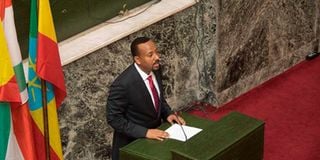Premium
Ethiopian embassy in Kenya among 30 to be closed

In this file photo taken on April 2, 2018 Abiy Ahmed, newly elected Prime Minister of Ethiopia, addresses the house of Parliament in Addis Ababa, after the swearing-in ceremony.
What you need to know:
- Prime Minister Abiy Ahmed said the country will shut down several embassies, including one in Kenya, to manage costs, with most diplomats working as non-resident ambassadors.
Ethiopia on Monday announced plans to cut the number of embassies it has in other countries by at least half in a bid to save costs.
In a briefing to Ethiopian lawmakers, Prime Minister Abiy Ahmed said the country will shut down several embassies, including one in Kenya, to manage costs, with most diplomats working as non-resident ambassadors.
“Ethiopia shouldn’t have 60 or so embassies and consulates in the present moment. Instead of throwing US dollars everywhere … at least 30 of the embassies should be closed. The ambassadors should instead be here,” he said.
He said the Ethiopian ambassador to Kenya, for example, could be based in Addis Ababa and only make field trips to meet with officials, while following events in Nairobi through the media.
"The Ethiopian ambassador in Kenya probably meets the foreign minister once a year or in two years" he said.
Abiy stressed the need for the Ethiopian Ministry of Foreign Affairs to undergo serious reforms.
"With the current situation Ethiopia is in, the country doesn't need to have as many as 60 or so embassies and consulates," he said.
Instead of hiring drivers, the Prime Minister further said, government ministers will be required to drive themselves.
“What we want is a person who gets wet in the mud and runs while reforming the country,” he said.
Impact of conflict
Following the conflict in Tigray, the Ethiopian government’s resources are overstretched.
Last week, it halted the offensive on the Tigray People’s Liberation Front after the war’s costs started affecting the country’s economy.
Addis Ababa admitted that the country had lost about $2.3 billion since the conflict in the Tigray region erupted in November 2020.
This cost did not factor in military spending, lost livelihoods, civilian deaths or injuries as well as hours of economic productivity lost as civilians fled danger.
‘Right decision’
Abiy said the withdrawal of the country's defense forces from Tigray was the right decision.
He explained that among reasons for the government's decision were economic and Covid-19 pressures.
"We have national projects to complete," he told MPs at Mondays session, at which the House approved a draft budget of 561.7 billion birr ($12.83 billion) for the next fiscal year.
Although diplomatic establishments are expensive, it is not clear how much money Ethiopia intends to save by closing embassies.
The question is whether the closure of as many as 30 Ethiopian embassies have a significant impact on Ethiopia's age-old diplomatic relations with countries including Kenya





